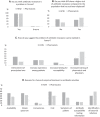Assessing Antimicrobial Resistance, Utilization, and Stewardship in Yemen: An Exploratory Mixed-Methods Study
- PMID: 34424858
- PMCID: PMC8592190
- DOI: 10.4269/ajtmh.21-0101
Assessing Antimicrobial Resistance, Utilization, and Stewardship in Yemen: An Exploratory Mixed-Methods Study
Abstract
Antimicrobial resistance (AMR), largely driven by irrational use of antimicrobials, is a global, multifaceted problem calling for a complete understanding of all contributory factors for effective containment. In conflict settings, war-wounds and malnutrition can combine with existing social determinants to increase demand for antibiotics, compounding irrational use. In this study, we focus on Yemen, a low-income country with active conflict for the last 5 years, and analyze the current status of awareness and stewardship efforts regarding AMR. We performed a survey of prescribers/physicians and pharmacists to describe perceptions of AMR prevalence, antibiotic use practices, and stewardship in Yemen, supported by a nonsystematic scoping literature review and a key informant interview. Participants (96%, N = 54) reported a perceived high AMR prevalence rate. Prescribers (74%, 20/27) reported pressure to prescribe broad-spectrum antibiotics. In the majority of cases (81%, 22/27), antimicrobial sensitivity tests (AST) were not performed to inform antibiotic choice. The main barrier to AST was cost. Most pharmacists (67%, 18/27) sold antibiotics without prescriptions. Amoxicillin (including amoxicillin-clavulanate) was the most-commonly prescribed (63%, 17/27) or dispensed (81%, 22/27) antibiotic. AST was rated the least important solution to AMR in Yemen. While there was awareness of a high AMR rate, stewardship is poor in Yemen. We note that barriers to the use of AST could be addressed through the deployment of reliable, affordable, quality rapid diagnostics, and AST kits. Compulsory continuing education emphasizing the use of AST to guide prescribing and patients' awareness programs could help avoid irrational use.
Figures


Similar articles
-
Addressing antimicrobial resistance in Nigerian hospitals: exploring physicians prescribing behavior, knowledge, and perception of antimicrobial resistance and stewardship programs.Expert Rev Anti Infect Ther. 2021 Apr;19(4):537-546. doi: 10.1080/14787210.2021.1829474. Epub 2020 Nov 2. Expert Rev Anti Infect Ther. 2021. PMID: 32990480
-
Opportunities and barriers to implementing antibiotic stewardship in low and middle-income countries: Lessons from a mixed-methods study in a tertiary care hospital in Ethiopia.PLoS One. 2018 Dec 20;13(12):e0208447. doi: 10.1371/journal.pone.0208447. eCollection 2018. PLoS One. 2018. PMID: 30571688 Free PMC article.
-
Critical points in the pathway of antibiotic prescribing in a children's hospital: the Antibiotic Mapping of Prescribing (ABMAP) study.J Hosp Infect. 2019 Apr;101(4):461-466. doi: 10.1016/j.jhin.2018.07.038. Epub 2018 Jul 30. J Hosp Infect. 2019. PMID: 30071268
-
A review of animal health and drug use practices in India, and their possible link to antimicrobial resistance.Antimicrob Resist Infect Control. 2020 Jul 8;9(1):103. doi: 10.1186/s13756-020-00760-3. Antimicrob Resist Infect Control. 2020. PMID: 32641109 Free PMC article. Review.
-
Balancing the risks to individual and society: a systematic review and synthesis of qualitative research on antibiotic prescribing behaviour in hospitals.J Hosp Infect. 2019 Apr;101(4):428-439. doi: 10.1016/j.jhin.2018.08.007. Epub 2018 Aug 9. J Hosp Infect. 2019. PMID: 30099092
Cited by
-
Antibiotic susceptibility patterns at the Médecins Sans Frontières (MSF) Acute Trauma Hospital in Aden, Yemen: a retrospective study from January 2018 to June 2021.JAC Antimicrob Resist. 2024 Mar 5;6(2):dlae024. doi: 10.1093/jacamr/dlae024. eCollection 2024 Apr. JAC Antimicrob Resist. 2024. PMID: 38449518 Free PMC article.
-
Exploring Prescription Practices: Insights from an Antimicrobial Stewardship Program at a Tertiary Healthcare Facility, Rwanda.Antibiotics (Basel). 2024 Jun 12;13(6):548. doi: 10.3390/antibiotics13060548. Antibiotics (Basel). 2024. PMID: 38927214 Free PMC article.
-
Refugee Crisis: Why Scientists and Scholars Need to Step Up.Am J Trop Med Hyg. 2022 Jul 13;107(1):12-13. doi: 10.4269/ajtmh.22-0195. Print 2022 Jul 13. Am J Trop Med Hyg. 2022. PMID: 35895364 Free PMC article. No abstract available.
-
MIC distribution analysis identifies differences in AMR between population sub-groups.Wellcome Open Res. 2024 May 9;9:244. doi: 10.12688/wellcomeopenres.21269.1. eCollection 2024. Wellcome Open Res. 2024. PMID: 39119595 Free PMC article.
-
COVID-19 and Antimicrobial Resistance: Data from the Greek Electronic System for the Surveillance of Antimicrobial Resistance-WHONET-Greece (January 2018-March 2021).Life (Basel). 2021 Sep 22;11(10):996. doi: 10.3390/life11100996. Life (Basel). 2021. PMID: 34685368 Free PMC article.
References
-
- World Bank , 2017. Drug-Resistant Infections: A Threat to Our Economic Future. Washington, DC: The World Bank.
-
- Haraoui DL-P, 2019. Armed conflicts and antimicrobial resistance: A deadly convergence. AMR Control 2019: 63–73.
-
- Abbara A. et al., 2018. A summary and appraisal of existing evidence of antimicrobial resistance in the Syrian conflict. Int J Infect Dis 75: 26–33. - PubMed
MeSH terms
Substances
LinkOut - more resources
Full Text Sources
Medical

